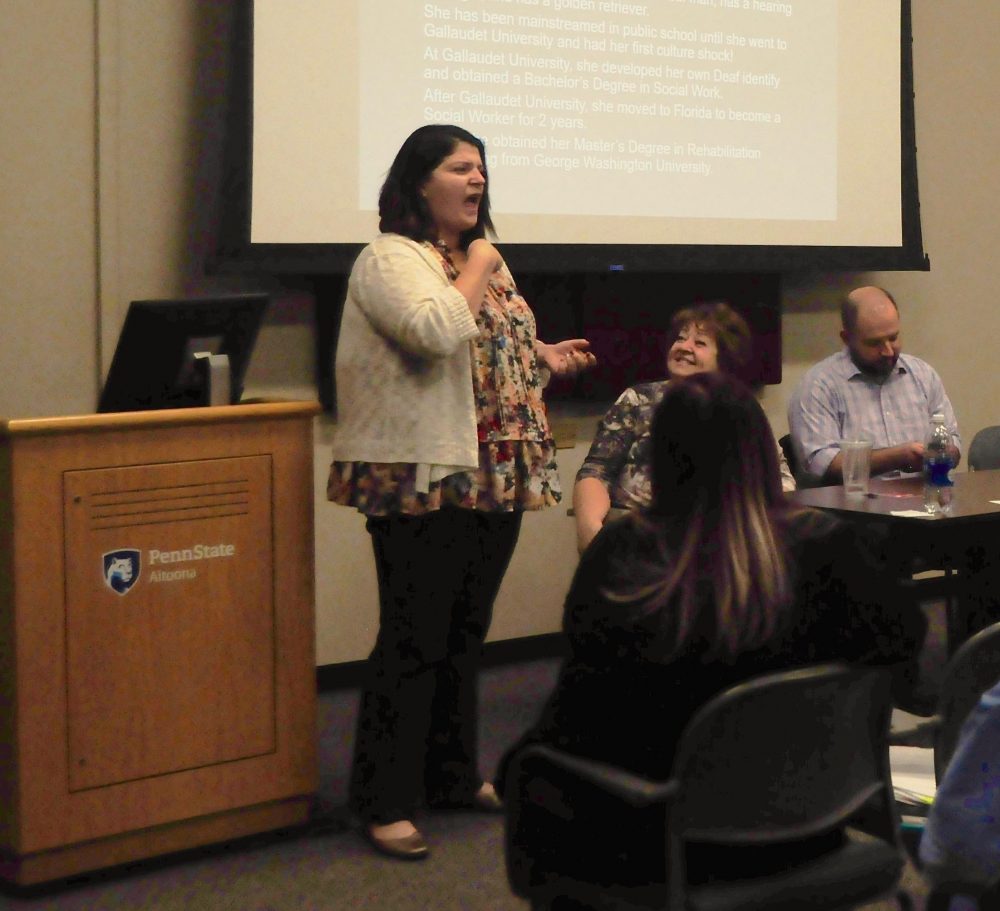By: Michelle Thompson
Photos: Marina Scipioni

On Wednesday, Nov. 1, Penn State Altoona hosted a Cultural Diversity Panel put together by two American Sign Language instructors, Ashley Bennett and Shasta Dreese. The panel was held in the Misciagna Family Center for Performing Arts and consisted of four deaf professionals, each of whom came with an ASL or verbal translator for both the hearing and hard-of-hearing audience’s convenience.
The panelist shared their background, their experience as a partially or fully deaf individual, and their involvement in the workforce. Some shared experiences of being the only deaf employee in a “hearing” work environment, while others spoke of their time working with fellow deaf individuals in various settings. Those who did work in hearing environments elaborated on the difficulties they faced.
“[My radiology internship] didn’t accept that I needed an interpreter with me,” said first panelist Erica Kauffman, “they thought that would violate HIPPA and confidentiality… so I ended up quitting.”
Panelist Leslie Kelly told the story of how she went from being partially deaf to profoundly deaf quite suddenly in the middle of her work day. Not knowing sign language or having an interpreter, she too had to quit because her position required her to take phone calls and interact with clients.

However, all four spoke of how they eventually found success and satisfaction in fields that helped fellow deaf individuals in professional or educational settings. Several of the panelists explained the importance of expanding resources and services to more than just those in the immediate community. During the Q&A session at the end of the panel, Erica Kauffman spoke on how the the education system can work to integrate deaf resources into the hearing world.
“American Sign Language is one of the top three most used languages in America,” said Kauffman, “so why don’t students and parents get together and propose to the board that maybe they have ASL as a foreign language in high schools?”
The panelists also had some personal stories and comical misunderstandings they encountered. Leslie Kelly shared a story about how her son tricked her into letting him blast rap music with explicit lyrics as they drove to school in the mornings because she could only feel the beat of the music but not hear the words. Kelly said it wasn’t until she realized she was getting dirty looks from the crossing guard that she investigated further and made her son listen to different music in the mornings.
Ashley Bennett shared what she said was an equally comical but mortifying experience when she bought a necklace in the mall and was chased down by mall security (which caused a big scene) because the cashier forgot to remove the security tag and Bennett didn’t even know the alarms had gone off when she left the store.

The panelists agreed that while these types of mishaps were funny to look back on, they still contributed to an internalized insecurity about their deafness that can affect a deaf person’s self esteem.
Amongst the audience were the students of panelist Ashley Bennett’s Intermediate Signing course at Saint Francis University. After the Q&A session, these students were encouraged to practice their ASL skills with the panelists or any other deaf members of the audience. In addition, all audience members had the opportunity to come up to the panelists and ask further questions or just chat.
